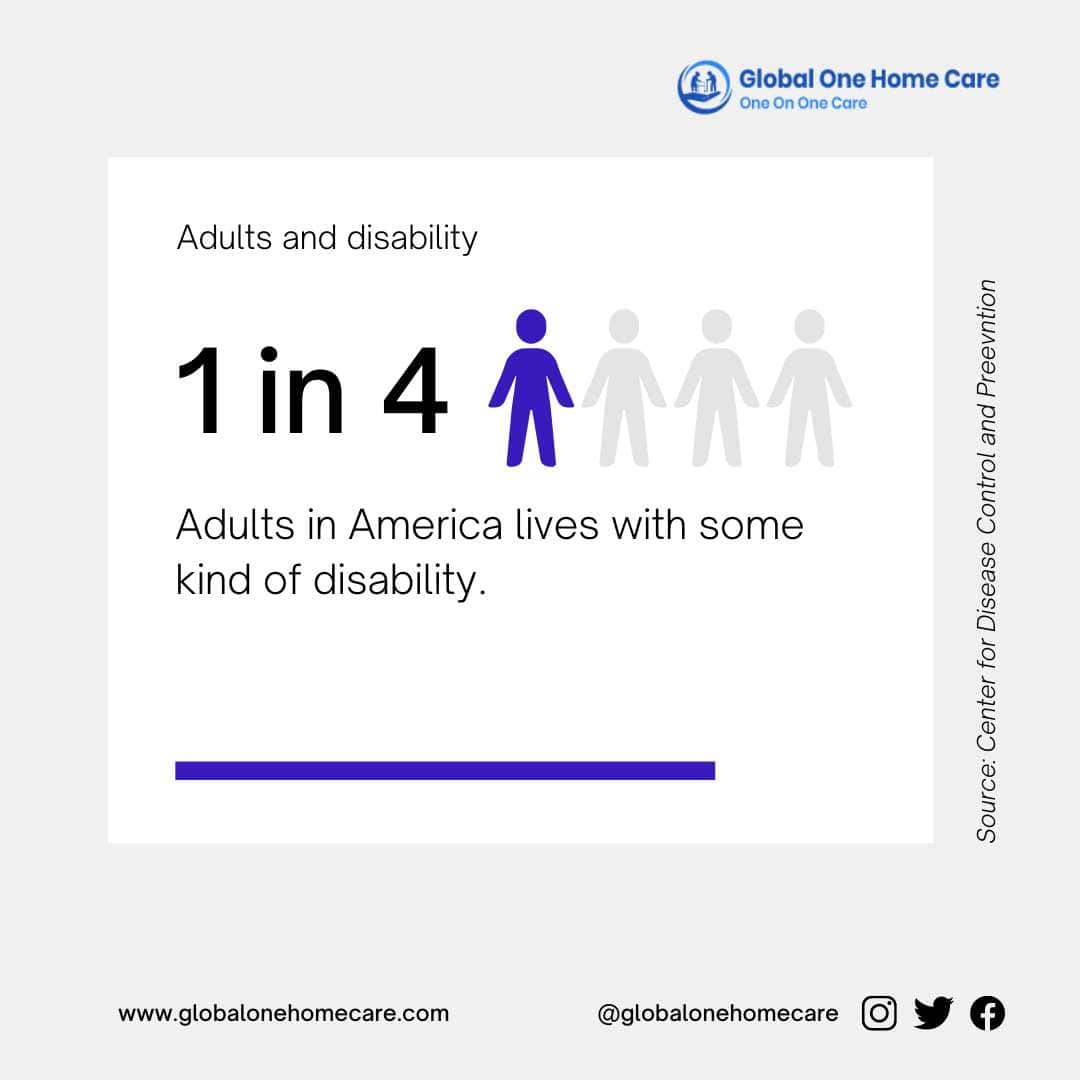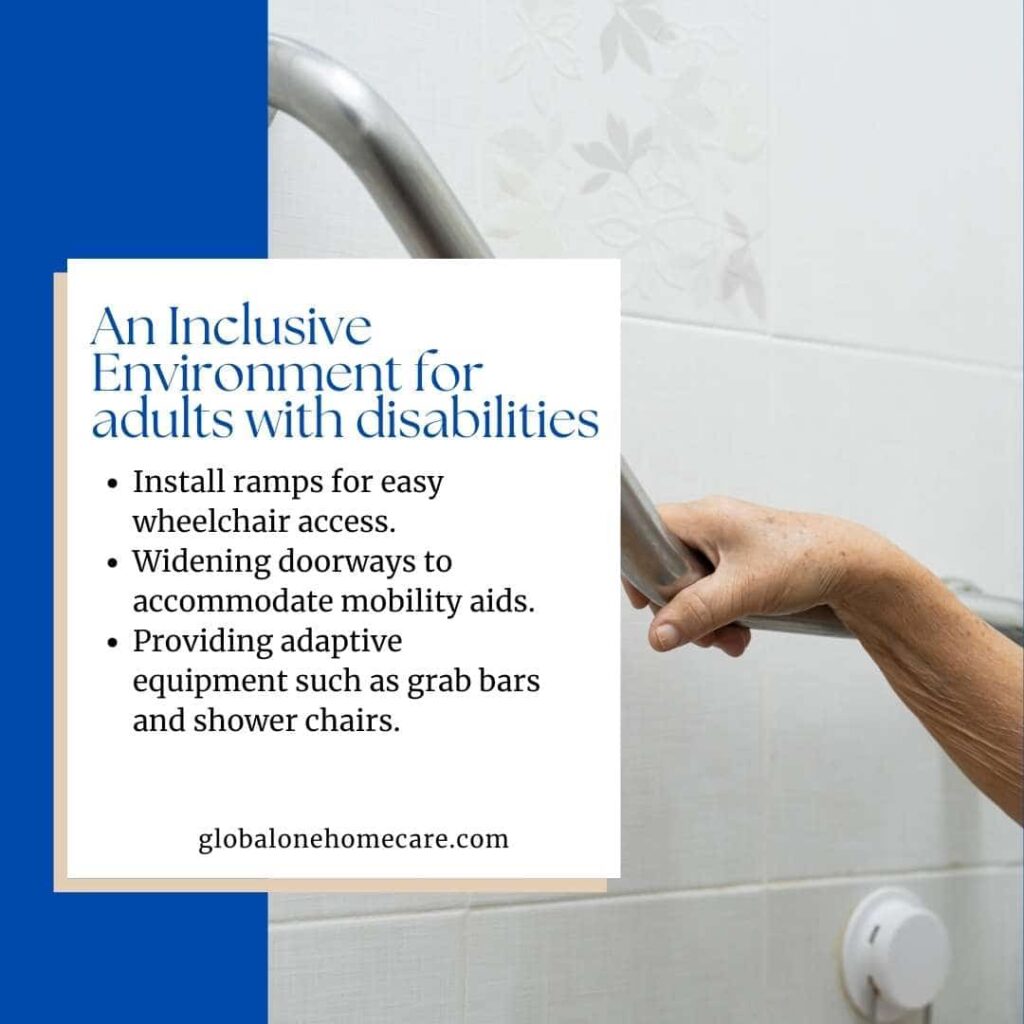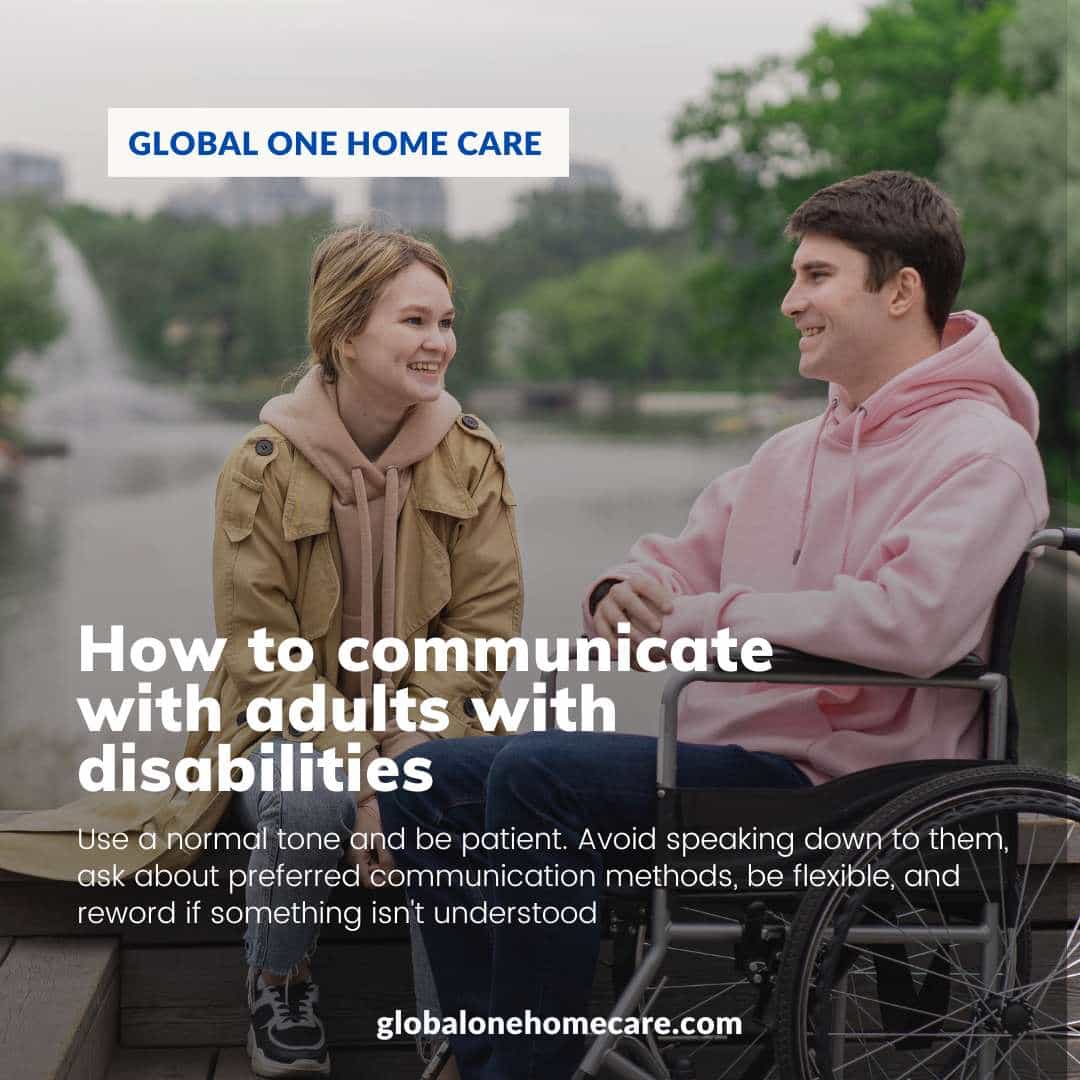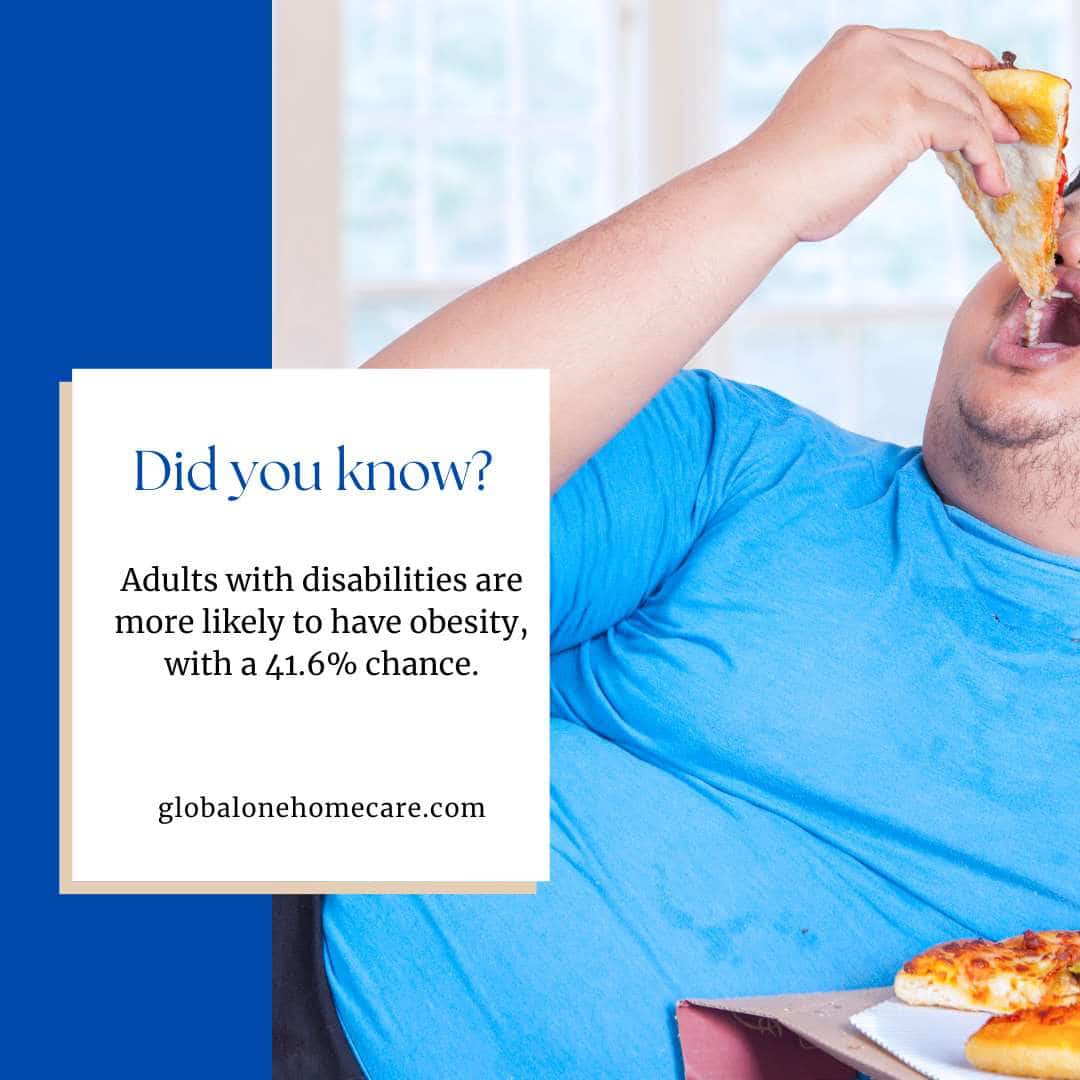-
Talk to Our Care Planner
1 in 4 adults in America lives with some kind of disability. Disability impacts all of us. Taking care of a loved one with a disability is not a bed of roses. Challenging, is the word.
March is Disabilities Awareness Month, which means you’re not alone.
Caring for adults with disabilities is a journey of empathy, understanding, and patience.

As an immigrant, some of the early jobs I had upon reaching the US were caring for adults with disabilities. So I’ve witnessed the incredible impact that tailored care can have on the lives of loved ones with special needs.
In this guide, I’ll share valuable insights and practical tips to help you navigate the journey of caring for a disabled adult, with confidence and compassion.
1. Understanding their Unique Needs
Walking, independent living, and cognition are three of the most common types of disability in the U.S.
Adults with disabilities encompass a wide spectrum, including physical, cognitive, and developmental challenges. Here are some categories to consider:
- Physical disabilities (e.g., mobility impairments, paralysis)
- Cognitive disabilities (e.g., intellectual disabilities, dementia)
- Sensory disabilities (e.g., visual or hearing impairments)
- Communication disabilities (e.g., speech disorders, non-verbal individuals)

The key to effective care is recognizing that each person’s needs are unique.
For instance, an individual with cerebral palsy might require assistance with mobility, while someone with autism may need support with communication and social interactions.
2. Creating an Inclusive Environment
An inclusive living space is essential for fostering independence and well-being for a disabled adult. Consider the following adjustments:
- Install ramps for easy wheelchair access.
- Widening doorways to accommodate mobility aids.
- Providing adaptive equipment such as grab bars and shower chairs.
For example, if your loved one uses a wheelchair, arrange furniture to ensure smooth movement and make sure counters are at a suitable height for them.

3. Establishing Effective Communication
Clear communication is the cornerstone of quality care. When verbal communication is a challenge, explore alternative methods like:
- Using picture boards or communication apps.
- Learning basic sign language or gestures.
- Being patient and attentive to non-verbal cues.
For instance, if you’re caring for a disabled adult who has limited verbal communication due to a speech disorder, encourage them to point to pictures or symbols to express their needs.
Tips for Successful Communication:
- Use a normal tone and be patient.
- Speak directly to the person, not their companion.
- Ask about preferred communication methods.
- Be flexible and reword if something isn’t understood.
- Avoid emphasizing their disability.
- Offer assistance respectfully.
- Apologize for mistakes.

4. Providing Emotional Support
Individuals with disabilities often experience emotional challenges. Some may struggle with frustration or feelings of isolation. To offer meaningful emotional support:
- Listen actively and show empathy.
- Engage in activities they enjoy to boost their mood.
- Connect them with support groups or therapists who specialize in their condition.
Imagine someone with Down syndrome expressing frustration. Offer a comforting presence and engage in an activity they love to ease their stress.
5. Assisting with Daily Activities
Providing in-home care for disabled adults obviously involves assistance with daily living. Assistance with daily tasks should prioritize maintaining dignity and independence.
Yes, you want to help them out but remember that they have a need to fill and be independent.
So for tasks like bathing, dressing, and grooming:
- Allow them to do as much as they can independently.
- Offer step-by-step guidance when needed.
- Respect their choices and preferences.
For instance, if the person you’re caring for has a physical disability and wants to dress themselves, provide adaptive clothing options that are easy to put on, instead of trying to DIY.
6. Medication Management
Proper medication management is crucial. If you’re not a healthcare-certified person, seek help from a more experienced healthcare provider, on how to manage medication.
Meanwhile, create a system by:
- Using pill organizers or medication reminders.
- Collaborating with healthcare professionals to create a schedule.
- Tracking medication intake to ensure adherence.
Imagine someone with epilepsy needing regular medication. Setting alarms and creating a medication log can help ensure they receive their doses on time.
If you’re taking care of a loved one with special medical needs/treatment, you may consider working with or hiring a home healthcare provider to care for them.
It’s important to understand the difference between home care and home health care.
7. Nutrition and Meal Planning

Adults with disabilities are more likely to have obesity, with a 41.6% chance.
A balanced diet is essential for overall health but it is even more important for adults with disabilities — for possible recovery, reducing chances of obesity, and more.
So what can you do?
Consider:
- Planning meals that accommodate dietary restrictions.
- Exploring texture-modified options for swallowing difficulties.
- Consulting a nutritionist to ensure proper nutrition.
For instance, if you’re caring for someone who has difficulty swallowing, offer foods like pureed soups and yogurt that are easier to consume.
8. Social Engagement and Community Involvement
Social interactions promote well-being and deal with the feeling of loneliness, frustration, and depression.
Encourage your loved one to engage in:
- Local support groups for shared experiences.
- Community events tailored to their interests.
- Volunteer opportunities to connect with others.

These are the best activities to help a disabled adult forget their condition and live a little. Be cautious of the activities you pick to make sure they don’t feel too challenged or uncomfortable.
Imagine someone with autism engaging in a local art class. It’s a chance to develop skills, build friendships, and feel a sense of accomplishment.
9. Respite Care for Caregivers
Caring for adults with disabilities can be mentally and physically demanding. To prevent burnout as you care for your loved one, consider these options:
- Seek respite care options to take breaks.
- Build a support network of friends and family.
- Prioritize self-care through hobbies and relaxation.
I can still picture myself as a caregiver juggling responsibilities – caring for adults with disabilities and trying to get a full-time job. Taking breaks allows you to recharge and provide better care for your loved one.
Learn more about respite care and how it can help your family.

Need a respite caregiver to help you care for your loved one while you catch up with other important things in life? We’re here to help.
Find your ideal respite caregiver with us today. Tell us what you need, and we’ll make it happen.
10. Legal and Financial Considerations
Financing can be a big issue with caring for a loved one with disabilities. How do you provide a secure financial future for them? Navigating legal and financial aspects can be overwhelming.
Consider:
- Establishing guardianship or power of attorney.
- Exploring government assistance programs.
- Setting up special needs trusts for financial security.
Imagine securing the future of someone with a disability by setting up a trust that ensures their long-term financial well-being.
FAQ Section
Frequently Asked Questions about Caring for Adults with Disabilities
How can I determine the best way to communicate with an adult with disabilities?
Understand their preferences and explore alternative communication methods, such as sign language or communication apps.
Use a normal tone and be patient, avoid speaking down to them, ask about preferred communication methods, be flexible and reword if something isn’t understood, Avoid emphasizing their disability, and offer assistance respectfully.
What should I consider when modifying my home for accessibility?
Focus on creating a barrier-free environment with ramps, wider doorways, and adaptive equipment like grab bars.
Are there resources available for respite care in my area?
Research local respite care services, support groups, and community centers that offer temporary relief for caregivers. At Global One Home Care, we offer respite care services where we provide families with super-experienced caregivers to help families care for a loved one with disabilities.
Contact us today, and let’s help you find the right respite caregiver for your needs.
What legal steps should I take to ensure I can make decisions on behalf of an adult with disabilities?
Consult legal experts to establish guardianship, power of attorney, and other legal arrangements for decision-making.
Conclusion
Caring for adults with disabilities is a journey that requires dedication and understanding. By tailoring your approach to their unique needs, creating an inclusive environment, fostering clear communication, and providing emotional support, you can make a meaningful impact on their lives.
Remember, it’s not just about caregiving; it’s about empowering individuals to lead fulfilling lives despite their challenges. By following these tips and seeking the right resources, you can embark on this journey with confidence and compassion.
Need help caring for your loved one with a disability? Let our compassionate respite caregivers take the weight off your shoulders. Contact us at Global One Home Care today to find the right care for your loved ones.
Dr. Ella Njike is the CEO and founder of Global One Home Care Boston, a Boston-based agency providing compassionate in-home support for seniors and individuals with disabilities. With a Doctorate and extensive experience working in the healthcare industry, Dr Ella brings a unique understanding to the challenges families face. He established Global One Home Care to ensure that care extends beyond daily tasks, focusing on building genuine connections and respecting each individual's journey. Dr. Njike is deeply committed to creating an environment where clients feel truly valued and at home.
Contact us
We aim to be an active partner in your care, not to take over. You are the CEO of your care, and we support you in managing it effectively.
Here are some features of our Global One Home Care
- 24/7 access to care
- Customized care plans
- Supervisory visits
- Caregiver introductions
- Nutritional planning
- Respite support
- Companionship
- Mobility assistance
- Durable Medical Equipment recommendations
- Errands and Shopping
- Fall Prevention
- ADLs

